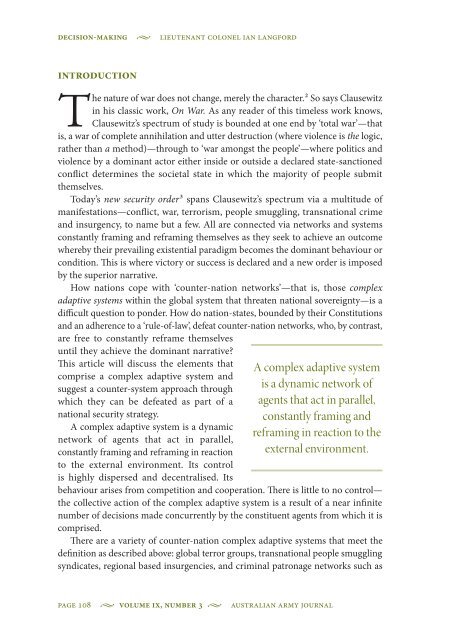Understanding and Defeating a Complex Adaptive ... - Australian Army
Understanding and Defeating a Complex Adaptive ... - Australian Army
Understanding and Defeating a Complex Adaptive ... - Australian Army
Create successful ePaper yourself
Turn your PDF publications into a flip-book with our unique Google optimized e-Paper software.
Decision-Making • Lieutenant Colonel Ian Langford<br />
Introduction<br />
The nature of war does not change, merely the character. 2 So says Clausewitz<br />
in his classic work, On War. As any reader of this timeless work knows,<br />
Clausewitz’s spectrum of study is bounded at one end by ‘total war’—that<br />
is, a war of complete annihilation <strong>and</strong> utter destruction (where violence is the logic,<br />
rather than a method)—through to ‘war amongst the people’—where politics <strong>and</strong><br />
violence by a dominant actor either inside or outside a declared state-sanctioned<br />
conflict determines the societal state in which the majority of people submit<br />
themselves.<br />
Today’s new security order 3 spans Clausewitz’s spectrum via a multitude of<br />
manifestations—conflict, war, terrorism, people smuggling, transnational crime<br />
<strong>and</strong> insurgency, to name but a few. All are connected via networks <strong>and</strong> systems<br />
constantly framing <strong>and</strong> reframing themselves as they seek to achieve an outcome<br />
whereby their prevailing existential paradigm becomes the dominant behaviour or<br />
condition. This is where victory or success is declared <strong>and</strong> a new order is imposed<br />
by the superior narrative.<br />
How nations cope with ‘counter-nation networks’—that is, those complex<br />
adaptive systems within the global system that threaten national sovereignty—is a<br />
difficult question to ponder. How do nation-states, bounded by their Constitutions<br />
<strong>and</strong> an adherence to a ‘rule-of-law’, defeat counter-nation networks, who, by contrast,<br />
are free to constantly reframe themselves<br />
until they achieve the dominant narrative?<br />
This article will discuss the elements that<br />
comprise a complex adaptive system <strong>and</strong><br />
suggest a counter-system approach through<br />
which they can be defeated as part of a<br />
national security strategy.<br />
A complex adaptive system is a dynamic<br />
network of agents that act in parallel,<br />
constantly framing <strong>and</strong> reframing in reaction<br />
to the external environment. Its control<br />
is highly dispersed <strong>and</strong> decentralised. Its<br />
A complex adaptive system<br />
is a dynamic network of<br />
agents that act in parallel,<br />
constantly framing <strong>and</strong><br />
reframing in reaction to the<br />
external environment.<br />
behaviour arises from competition <strong>and</strong> cooperation. There is little to no control—<br />
the collective action of the complex adaptive system is a result of a near infinite<br />
number of decisions made concurrently by the constituent agents from which it is<br />
comprised.<br />
There are a variety of counter-nation complex adaptive systems that meet the<br />
definition as described above: global terror groups, transnational people smuggling<br />
syndicates, regional based insurgencies, <strong>and</strong> criminal patronage networks such as<br />
page 108 • Volume IX, Number 3 • <strong>Australian</strong> <strong>Army</strong> Journal

















